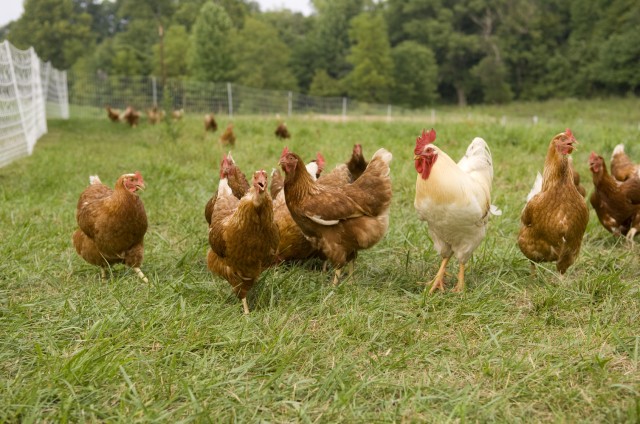Jonathan Kaplan, director of the NRDC’s food and agricultural program, says his organization had several meetings with Brown staffers in which they outlined reasons why Brown should veto the bill. “Mostly they just listened," he said. "They were very focused on understanding what the bill would actually do and how it would impact antibiotic use."
It seems the advocates' message got through. In his veto statement, the governor noted:
The Centers for Disease Control and Prevention estimates conservatively that at least two million illnesses and 23,000 deaths are caused by antibiotic-resistant bacteria in the United States each year. Scientists around the world are warning that we are over-using these life-saving medicines in both human medicine and to raise animals.
Brown directed the state's Department of Food and Agriculture to work with legislators to find "new and effective ways to reduce the unnecessary antibiotics used for livestock and poultry."
“The governor sent a message that he isn’t going to accept fig-leaf solutions to tackle this problem,” Kaplan said.
It would be hard not to see the veto as a rebuke of the California Assembly's Agricultural Committee. Earlier this year a more reform-minded antibiotics and livestock bill, sponsored by Assemblyman Kevin Mullin (D-San Mateo), was up for an initial vote in the committee. Mullin’s bill would have made reporting antibiotic use a legal requirement, something public health experts say is badly needed in the U.S., and cut down on disease prevention loopholes.
At the time I interviewed one of the bill’s opponents, Bill Mattos, president of the California Poultry Federation. Mattos seemed surprised that the Mullin bill would even merit a story. With the seasoned air of a lobbyist who knows how to count votes, Mattos told me that the “Mullin bill was going nowhere.” He said that it was going to be killed in committee. Mattos suggested I instead cover the “more reasonable” Hill bill.
Mullin could count votes, too. Facing a near-unanimous defeat, the assemblyman withdrew his bill. "Better to fight another day," said Mullin’s dejected-sounding chief of staff, Hugh Bower.
Committee members left no doubt they would have indeed rejected Mullin’s bill. In a hearing, committee chair Susan Talamantes Eggman (D-Stockton) suggested that the earlier bill had been insulting to veterinarians. “I happen to know the vet at Foster Farms, who is a seasoned professional.” Eggman went on to say that she thought that the Foster Farms veterinarian would no more abuse his license than she would as a licensed social worker.
But serious concerns about antibiotic practices at large chicken companies like Foster Farms are growing.
Last month a hard-hitting Reuters investigation detailed how the nation’s largest poultry producers continue to routinely feed chickens an array of antibiotics -– not just when sickness strikes, but as standard practice.
In 2013 an antibiotic-resistant form of salmonella linked to Foster Farms chicken hospitalized hundreds of people, mostly in California. Many patients had serious complications, including blood poisoning. A CDC official who helped investigate the outbreak told Reuters that the use of chlortetracycline and penicillin by Foster Farms could have contributed to the resistance patterns.
Last week the company issued a new recall for frozen chicken they say could be contaminated with listeria. No one has contracted the disease, but listeria is one of the most frightening foodborne illnesses. A 2011-2012 outbreak, traced to cantaloupes, killed 33 people.
The treatment for listeria is a regimen of antibiotics. But in a study earlier this year from the Zurich-based Institute of Food, Nutrition and Health, researchers noted that the overuse of antibiotics as a feed additive in livestock may be leading to increased instances of antibiotic-resistant listeria, potentially making the disease even more lethal.
For decades the debate over antibiotics in livestock has been in a kind of stalemate. Reformers push for tough regulations and industry pushes back. But that equation appears to be changing.
This summer the iconic chicken company Perdue Chicken, responding to growing public health concerns and what their director of food safety, Bruce Stewart Brown, said was “feedback from their own customers,” announced new antibiotic standards that match even the toughest European regulatory standards. The fast food company Chick-fil-A has gone even further, pledging to go antibiotic free.
Meanwhile the Obama administration has added to the sense of urgency to do more to address concerns over antibiotic resistance. The White House said in a Sept. 18 executive order that "combating antibiotic-resistant bacteria is a national security priority.” An accompanying report detailed mounting evidence linking antibiotic resistance in people with corresponding overuse of antibiotics in agriculture.
By sending a bill he found lacking back to the Legislature, Brown has put California in the position to have more than a symbolic impact on those calls for reform.
“California has a long tradition of being a national model," the NRDC's Kaplan said. "We’ve seen it in the past with climate change. We are a major agricultural state, and we have a big population. If we change livestock production in California, then it becomes a significant model for the rest of the nation."
